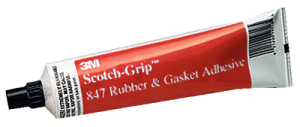
When installing gaskets, you may want to use gasket sealant. Gaskets are often exposed to heat, pressure and chemicals. Over time, the combination of these elements can degrade gaskets. Gaskets may begin to leak, or they fail completely. Fortunately, you can reinforce gaskets so that they are less likely to leak and fail by using gasket sealant.
What Is Gasket Sealant?
Gasket sealant is an adhesive product that’s designed to strengthen and reinforce gaskets. Gaskets, of course, are mechanical seals. They are used to seal the mating surface between two or more parts. Most gaskets consist of a flat piece of material with cutouts for the respective parts. You can install gaskets around the mating surface of parts so that they don’t leak.
There are different types of gasket sealant, but most of them consist of an adhesive. You can apply a gasket sealant to the front and back sides of a gasket. Once applied, you can press the gasket into the mating surface. The gasket sealant will strengthen and reinforce the gasket while subsequently protecting it from leaks.
How Gasket Sealant Works
Gasket sealant works by completely filling the space between a gasket and mating surface. It only takes a single minor imperfection on the surface of a gasket to cause a leak. Maybe the surface is cracked or perhaps it suffers from a manufacturing defect. Regardless, gaskets can leak if they have an irregular surface.
With gasket sealant, you can fill the space between a gasket and mating surface. Most gasket sealants will cure automatically at room temperature. You don’t have to expose them to ultraviolet (UV) light. After applying the gasket sealant, it will begin to cure automatically. The gasket sealant will then harden over the gasket, thus filling any cracks or other spaces.
Benefits of Using Gasket Sealant
Leaks are less likely to occur with gasket sealant. As previously mentioned, it will completely fill the space between a gasket and mating surface. You can apply gasket sealant to the front and back of a gasket.
Applying gasket sealant will also strengthen the gasket so that it’s less likely to crack. Whether made of steel, aluminum, carbon fiber or any other material, gaskets can crack. Cracked gaskets are typically more problematic than warped gaskets. They’ll cause larger leaks, which can damage the machines or equipment with which they are used. If you’re worried that a gasket will crack, you may want to apply gasket sealant when installing it.



